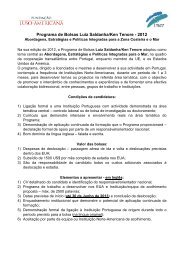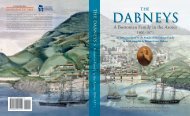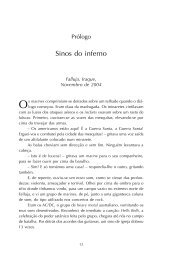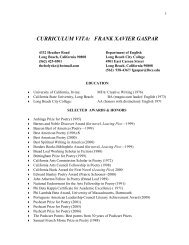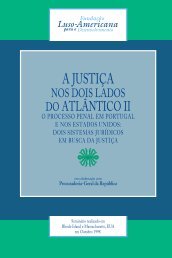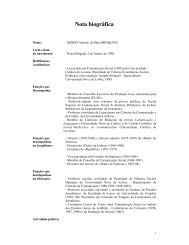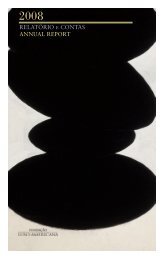A decade later - Fundação Luso-Americana
A decade later - Fundação Luso-Americana
A decade later - Fundação Luso-Americana
You also want an ePaper? Increase the reach of your titles
YUMPU automatically turns print PDFs into web optimized ePapers that Google loves.
was,” he admits. Prior to his stay at Ledig<br />
House, he had published two books of<br />
poetry and his popular debut novel Nenhum<br />
olhar, which was printed in the US as The<br />
Implacable order of Things.<br />
Like José Luís Peixoto, Rui Zink and Inês<br />
Pedrosa also had books published in English<br />
after being at Ledig House. “The idea<br />
behind these programs, is to gain a foothold<br />
in the American market, because of<br />
the importance of the English language,”<br />
the head of the DGLB, Ana Castro, explains.<br />
Though it is not the main feature of the<br />
writers-in-residence programs – at least as<br />
far as the personal experiences of the writers<br />
themselves is concerned – the DGLB’s<br />
programs promoting translation of<br />
Portuguese works is also part of the organization’s<br />
drive to disseminate Portuguese<br />
authors abroad. Or at least it used to be.<br />
By October, 2010, the DGLB’s functions<br />
were already severely curtailed after a year<br />
of drastic budget cuts. Things only got<br />
worse in 2011, after the government fell<br />
and the country ground to a standstill.<br />
DGLB programs such as its landmark<br />
“itinerant” program for local libraries,<br />
aimed at encouraging reading, were suspended,<br />
as were the literary residency programs,<br />
despite the increase in applications.<br />
“There was a real upswing in the last two<br />
years,” explains Assunção Mendonça, a<br />
member of the DGLB, who helps process<br />
the applications. “That’s word-of-mouth<br />
in action.”<br />
The year José Luís Peixoto was attending<br />
the Ledig House’s inaugural program, Paulo<br />
Moreiras was coming out with his historical<br />
novel A Demanda de D. Fuas Bragatela, the<br />
precursor to his novel os Dias de Saturno.<br />
Moreiras would be one of the last writers<br />
to receive DGLB backing, like João Tordo,<br />
last year’s Ledig fellow. At the time Moreiras<br />
was working on his still-unpublished third<br />
historical novel set in Portugal during the<br />
Liberal Wars. His stay at Ledig House was<br />
the tipping point for the book. “When I<br />
left, I already had an idea about how the<br />
whole book would go. I’d done the research<br />
and sketched out a bit of the text. At Ledig,<br />
I managed to write several chapters and<br />
flesh them out, which would have been<br />
harder and taken longer otherwise. The fact<br />
that I had so much time to work allowed<br />
me to hone the text I was writing. I’d write,<br />
then always review it. You had time to do<br />
everything. What a blessing!”<br />
Even the writers who put their trust in<br />
that incorporeal entity commonly known<br />
as “inspiration,” know that no book rises<br />
from the dark depths of the drawer to the<br />
heights of public notice without grueling,<br />
cuLTure<br />
“i remember a house, surrounded by beautiful scenery with all the colors of autumn,”<br />
recalls writer José Luís peixoto.<br />
‘ The idea behind these programs,<br />
is to gain a foothold in the American<br />
market, because of the importance<br />
of the english language.<br />
’<br />
Ana castro, DGLB<br />
tiring, exhausting and – let’s admit it –<br />
plodding work. It may not be as stultifying<br />
as a postal worker’s routine but, most<br />
of the time, it’s also not the romantic life<br />
of Lord Byron. But can you get back into<br />
the swing of things when you’re jetlagged,<br />
and in a different room, house,<br />
and, country? It depends on a number of<br />
factors, including the organizational mindset<br />
of the writer and at what stage he is<br />
in the work. Paulo Moreiras had no trouble<br />
getting up at 6 a.m. again, as he always<br />
had in Portugal. “I was always the first<br />
one up; I’d watch the deer walking in the<br />
garden, have breakfast, and watch the sun<br />
rise. At about 7, I’d start to write.<br />
Dinnertime, when we’d all get together<br />
to socialize, was our only commitment.<br />
So I had hours upon hours to work and<br />
polish the text.”<br />
As a writer, David Machado is also persistent<br />
and methodical. “I took the first<br />
chapter of Deixem Falar as<br />
Pedras with me and had a<br />
very concrete idea about<br />
how the rest of the book<br />
would go. I’d get up<br />
between 7 and 8 and<br />
work 8 hours straight<br />
with a short break for<br />
lunch. Every once in a<br />
while I’d take a long walk<br />
over the grounds and in<br />
the surrounding woods.<br />
I didn’t work at night because I don’t like<br />
to.” He was at Ledig House for a month<br />
– the usual time – and it was only around<br />
the fourth week that his enthusiasm started<br />
to wane. “I was most productive at the<br />
beginning. When I got there, I luxuriated<br />
in all the silence; everything was so peaceful<br />
and calm. I felt it and started to work<br />
non-stop. I’m the kind of person who<br />
makes plans like ‘if I write four pages a<br />
day, I’ll have X number of pages a month<br />
from now.’ But it didn’t turn out that way<br />
because the pace changed.”<br />
With the exception of José Luís Peixoto,<br />
who doesn’t believe that writing away<br />
from home is “particularly advantageous,”<br />
all the writers interviewed by Parallel found<br />
that the creative process was enhanced by<br />
the unfamiliarity of their new surroundings.<br />
David Machado was already far into<br />
the creative phase for Deixem Falar as Pedras,<br />
and it was in the house on the Hudson<br />
Parallel no. 6 | FALL | WINTER 2011 75<br />
DR



